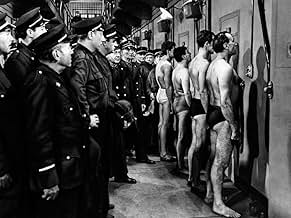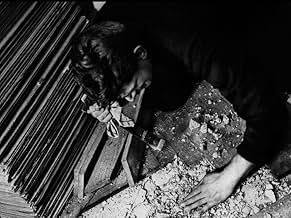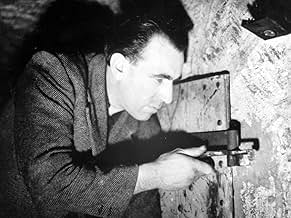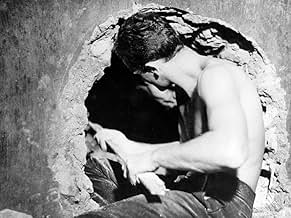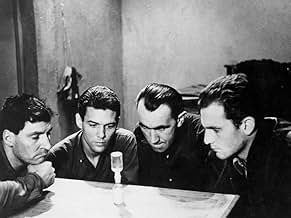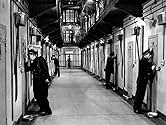IMDb-BEWERTUNG
8,5/10
22.165
IHRE BEWERTUNG
Vier Häftlinge mit langjährigen Haftstrafen haben einen ausgeklügelten Ausbruchsplan, in den sie einen neuen Insassen einweihen, damit er sich ihrem Vorhaben anschließt. Misstrauen und Ungew... Alles lesenVier Häftlinge mit langjährigen Haftstrafen haben einen ausgeklügelten Ausbruchsplan, in den sie einen neuen Insassen einweihen, damit er sich ihrem Vorhaben anschließt. Misstrauen und Ungewissheit sind die Folge.Vier Häftlinge mit langjährigen Haftstrafen haben einen ausgeklügelten Ausbruchsplan, in den sie einen neuen Insassen einweihen, damit er sich ihrem Vorhaben anschließt. Misstrauen und Ungewissheit sind die Folge.
- Nominiert für 2 BAFTA Awards
- 2 Gewinne & 4 Nominierungen insgesamt
Marc Michel
- Claude Gaspard
- (as Mark Michel)
Jean-Paul Coquelin
- Le lieutenant Grinval
- (as J. Paul Coquelin)
Albert Augier
- Un gardien
- (Nicht genannt)
Jean Becker
- Un gardien
- (Nicht genannt)
Mick Besson
- Deuxième plombier
- (Nicht genannt)
Georges Bielec
- Figurant
- (Nicht genannt)
Raymond Bour
- Un gardien
- (Nicht genannt)
Philippe Dumat
- Un gardien
- (Nicht genannt)
Gérard Hernandez
- Le détenu à l'infirmerie
- (Nicht genannt)
Jean Luisi
- Un détenu
- (Nicht genannt)
Empfohlene Bewertungen
Le Trou played on TV the other night, and thus gives me a chance to evaluate it after 20 years or so. The direction is magnificent: Becker was a genius at refining the elements of the story down to a bare minimum. Space is used well; the close-ups of men banging on concrete with improvised tools in a cramped space are very effective, they look like burrowing animals. Ghislain Cloquet was a master of black-and-white camerawork; he shot Mouchette and Au hasard, Balthazar for Bresson, Nuit et brouillard for Resnais, Le Feu follet for Malle, all great films made greater by Cloquet's work.
The endless dull routine enlivened by subterfuge--stealing materials needed for digging and making puppets to stand in for sleeping prisoners is brilliantly captured. If the prisoners are bored, so are the staff--the warden is desperate for some conversation with Gaspard, or with anybody. Geo's problem is a little hard to understand, I thought he'd want to go through with the plan. Otherwise I rate it very highly indeed.
The endless dull routine enlivened by subterfuge--stealing materials needed for digging and making puppets to stand in for sleeping prisoners is brilliantly captured. If the prisoners are bored, so are the staff--the warden is desperate for some conversation with Gaspard, or with anybody. Geo's problem is a little hard to understand, I thought he'd want to go through with the plan. Otherwise I rate it very highly indeed.
Jacques Becker's "Le Trou" is one of the greatest of all prison-break films. No film lover should miss it. It is every bit as masterful and tense as other milestones of this subgenre, including John Sturges' "The Great Escape," Robert Bresson's masterpiece "A Man Escaped," and Don Siegel's "Escape from Alcatraz." The meticulous preparation for the escape is a nail-biter, with many adrenaline-inducing close calls. The ringer: Will the newly exonerated prisoner stay with the group and escape or rat on the others? Those seeking pure entertainment or those seeking existentialist philosophical fare will be equally pleased. A memorable movie experience.
Before his life was cut short prematurely, Director Jacques Becker created his very personal film, "Le Trou" ("The Hole"). Using mostly then nonprofessional actors, M. Becker elicited extremely naturalistic and powerful performances in a reportedly true-life prison-escape drama set in France.
It was especially interesting to see Marc Michel in his film debut. Made four years before Michel scored a hit as Roland in "Les Parapluies de Cherbourg," Michel here subtely creates a fascinating character. His work is seemingly effortless, yet always intriguing. He stands at the center of a group of convicts planning a daring escape--a group which has difficulty in fully trusting his loyalty.
The routine of prison life as well as the actual escape is done with such detail that the viewer feels part of the action. The black-and-white photography enhances the realism of the presentation, done without a musical background.
Generally a "forgotten film," "Le Trou" is a carefully constructed prison drama, most convincingly executed. It is a credit to both a hard working cast and director.
It was especially interesting to see Marc Michel in his film debut. Made four years before Michel scored a hit as Roland in "Les Parapluies de Cherbourg," Michel here subtely creates a fascinating character. His work is seemingly effortless, yet always intriguing. He stands at the center of a group of convicts planning a daring escape--a group which has difficulty in fully trusting his loyalty.
The routine of prison life as well as the actual escape is done with such detail that the viewer feels part of the action. The black-and-white photography enhances the realism of the presentation, done without a musical background.
Generally a "forgotten film," "Le Trou" is a carefully constructed prison drama, most convincingly executed. It is a credit to both a hard working cast and director.
Immediate background:Jacques Becker was dying when he filmed "le trou,and he made it his legacy;it's the tragedy of man caught on the web of life -an admirable metaphor shows two wardens feeding a spider in the undergrounds with a fly-,and anyway unable to escape from the final death.
The first thing to bear is mind is that,calling "le trou" a "prison movie" would be an insult.Although adapted from a Jose Giovanni's book -Giovanni had been himself in jail for some time and his depictions are as close to reality as can be-,Becker masterfully transcends his subject and gives something definitely new.Some said it was the final link between "la nouvelle vague" and what the highbrows pejoratively -and thoroughly unfairly- call "cinema de qualité" but Becker had predated that overrated new wave by almost ten years :"rendez-vous de juillet" had already almost everything the young Turks would bring later.
First shock is the use of the wide screen,the cinemascope,which Becker had never experimented before;and he achieved the impossible: using this device for a story which takes place ,either in the four walls of a jail,or in the undergrounds and the sewers .The only picture of the outside is seen when the two inmates open a manhole.And the second one is the sound:there's no music at all,except for the final cast and credits -saving the cast and credits for the end was very rare in the contemporary French cinema -But the soundtrack resembles some kind of musique concrete with its relentless thumps, the whispers and the screams inside the cell,the creaking of the doors ,the waters in the sewer;and the final cacophony -which is not unlike the one which Manliewicz used in "suddenly last Summer" the year before- packs a real wallop.
Another Becker's tour de force is his description of the prison life:he avoids all the clichés that mar so many "prison movies" (the overpraised "Whatsisname redemption" is no exception):here, the wardens are,most of the time ,kind and friendly,the relationships with the inmates remain polite ,maybe sometimes too much:particularly those between the young man (Marc Michel) and the head warden are almost paternalistic.
Another Becker's permanent feature comes back to the fore in "le trou" :friendship,solidarity ,which was already present in "rendez-vous de juillet" and "touchez pas au grisbi".Here it's pure manly friendship and it seems that a certain misogyny is infiltrating Becker's world:during the 2 hours + running time of the movie,we only see one young girl (Catherine Spaak) behind a grille,for a very short while.The only positive woman whom we' ll never see is (naturally) one of the five inmates ' s(Michel Constantin) mother("I almost killed her when I was sent to jail so I do not want to take a chance and try to escape")
SPOILER:But even this world where five inmates share everything,where their friendship is "more than I 've ever had "(Marc Michel's character) is collapsing;the first cracks were already here in "rendez-vous de juillet" when some of the young students were giving up on their plans ,to the main hero's (Daniel Gelin)disappointment.But "touchez pas au grisbi" took friendship over everything including money."Le trou" reveals the true nature of man,even if the informer seems completely desperate at the end of the movie.The mammoth task they did ,the hole '(le trou) is nothing but a cul-de -sac and it epitomizes,in a Hustonian way -we're closer to Huston than to Godard ,fortunately,the vanity of everything man can do to escape from his fate,and in the case of Becker ,to escape from death.END OF SPOILER
Had Becker ended his career with his three precedent movies (Ali-Baba,Arsène Lupin ,Montparnasse 19),his former masterpieces (Casque d'or,Goupi Main Rouges ,rendez-vous de juillet),could have been tarnished by association.But "Le trou" ,his final masterpiece stands in little danger of bringing this about.
The first thing to bear is mind is that,calling "le trou" a "prison movie" would be an insult.Although adapted from a Jose Giovanni's book -Giovanni had been himself in jail for some time and his depictions are as close to reality as can be-,Becker masterfully transcends his subject and gives something definitely new.Some said it was the final link between "la nouvelle vague" and what the highbrows pejoratively -and thoroughly unfairly- call "cinema de qualité" but Becker had predated that overrated new wave by almost ten years :"rendez-vous de juillet" had already almost everything the young Turks would bring later.
First shock is the use of the wide screen,the cinemascope,which Becker had never experimented before;and he achieved the impossible: using this device for a story which takes place ,either in the four walls of a jail,or in the undergrounds and the sewers .The only picture of the outside is seen when the two inmates open a manhole.And the second one is the sound:there's no music at all,except for the final cast and credits -saving the cast and credits for the end was very rare in the contemporary French cinema -But the soundtrack resembles some kind of musique concrete with its relentless thumps, the whispers and the screams inside the cell,the creaking of the doors ,the waters in the sewer;and the final cacophony -which is not unlike the one which Manliewicz used in "suddenly last Summer" the year before- packs a real wallop.
Another Becker's tour de force is his description of the prison life:he avoids all the clichés that mar so many "prison movies" (the overpraised "Whatsisname redemption" is no exception):here, the wardens are,most of the time ,kind and friendly,the relationships with the inmates remain polite ,maybe sometimes too much:particularly those between the young man (Marc Michel) and the head warden are almost paternalistic.
Another Becker's permanent feature comes back to the fore in "le trou" :friendship,solidarity ,which was already present in "rendez-vous de juillet" and "touchez pas au grisbi".Here it's pure manly friendship and it seems that a certain misogyny is infiltrating Becker's world:during the 2 hours + running time of the movie,we only see one young girl (Catherine Spaak) behind a grille,for a very short while.The only positive woman whom we' ll never see is (naturally) one of the five inmates ' s(Michel Constantin) mother("I almost killed her when I was sent to jail so I do not want to take a chance and try to escape")
SPOILER:But even this world where five inmates share everything,where their friendship is "more than I 've ever had "(Marc Michel's character) is collapsing;the first cracks were already here in "rendez-vous de juillet" when some of the young students were giving up on their plans ,to the main hero's (Daniel Gelin)disappointment.But "touchez pas au grisbi" took friendship over everything including money."Le trou" reveals the true nature of man,even if the informer seems completely desperate at the end of the movie.The mammoth task they did ,the hole '(le trou) is nothing but a cul-de -sac and it epitomizes,in a Hustonian way -we're closer to Huston than to Godard ,fortunately,the vanity of everything man can do to escape from his fate,and in the case of Becker ,to escape from death.END OF SPOILER
Had Becker ended his career with his three precedent movies (Ali-Baba,Arsène Lupin ,Montparnasse 19),his former masterpieces (Casque d'or,Goupi Main Rouges ,rendez-vous de juillet),could have been tarnished by association.But "Le trou" ,his final masterpiece stands in little danger of bringing this about.
I watched this masterpiece first time before 10 years and I was stunned. Now, I watched it before few days again and I am really surprised how this remarkable movie functions and become better and better. It is really ingenious portrait of human interaction and cooperation, great "prison-escape" drama that bring us unique way of telling story (in long shots) looking so realistic and powerful.
One of the best movies I've ever seen!
10/10
One of the best movies I've ever seen!
10/10
Wusstest du schon
- WissenswertesThe scene where three different characters take turns breaking through the concrete floor of their cell is filmed in a single, nearly four minute long, shot.
- PatzerWhen Geo checks the corridor with the mirror and takes a break to say goodbye to his cellmates, he leaves the mirror in the hole. However, when he goes back to checking the corridor he has to stick the mirror back into the hole first.
- Zitate
[last lines]
Roland Darban: [stripped, facing the wall under guard] Poor Gaspard.
- VerbindungenFeatured in Mon père, il m'a sauvé la vie (2001)
Top-Auswahl
Melde dich zum Bewerten an und greife auf die Watchlist für personalisierte Empfehlungen zu.
- How long is The Hole?Powered by Alexa
Details
Box Office
- Bruttoertrag in den USA und Kanada
- 34.588 $
- Eröffnungswochenende in den USA und in Kanada
- 6.756 $
- 2. Juli 2017
- Weltweiter Bruttoertrag
- 34.588 $
- Laufzeit2 Stunden 11 Minuten
- Farbe
- Seitenverhältnis
- 1.66 : 1
Zu dieser Seite beitragen
Bearbeitung vorschlagen oder fehlenden Inhalt hinzufügen




